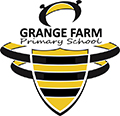Religious Education
In their RE learning at Grange Farm, pupils explore big questions about life to find out what people believe and what difference this makes to how they live, so that they can make sense of religion whilst also reflecting on their own ideas and ways of living. Through quality teaching, children understand a range of religions and worldviews. They describe and analyse beliefs and practices held by religious and non-religious people and comminutes. Grange Farm children have opportunities to visit places of worship, to hear from religious leaders and experience in a more holistic way, the inner workings and atmospheres of sacred spaces. We invite people of faith in to visit school to share their beliefs and traditions with children in RE lessons too.
Through their RE learning, pupils develop all important tolerance and respect for those who live differently. They learn more about others in their communities and listen to them explain what matters most to them. Children are given opportunity to speak about their own views and beliefs about religion and ethics. Our pupils build investigative skills as they move through the school; in all Key Stages, they consider key concepts and questions relating to belonging, meaning, purpose and truth, often responding creatively.
Learning through the Key Stages
Learning in Early Years Foundation Stage (EYFS) and Key Stage One (KS1) is deliberately focused on stories and the exploration of familiar examples of embodied religion and worldviews, such as the celebration of festivals or the significance of bodily rituals. These are drawn from a range of religion and worldviews. RE in the EYFS focuses on just three of the seven concepts, allowing early years practitioners to explore these concepts in depth through good early years practice.
In KS1, three more concepts are added, exploring these through worldviews case studies that illustrate familiar themes, such as festivals and celebrations, sources of wisdom and the types of thinking that leads to choices about how people choose to act and live. At the end of the key stage, pupils explore Christianity through the specific lens of the destruction of Coventry Cathedral during WW2, using disciplinary methods and tools to explore this significant local event and story as theologians and historians.
From lower Key Stage Two (KS2) onwards, pupils engage with increasingly sophisticated enquiry questions drawing upon a range of disciplines and a diverse range of case studies drawn from religious and non-religious worldviews. They may look at familiar stories and rituals from different angles and will begin to see the similarities in the worldviews people inhabit, as well as the key differences that lead to such diversity and nuance. They will have a deeper sense of worldviews as embodied and expressive of what people do and how they act as much as they are about what people think and believe. The concept of peace and reconciliation is opened up to include perspectives from worldviews other than Christian worldviews.
In upper KS2, pupils are challenged to think deeply as they encounter some of the problematic and challenging aspects of religion and worldviews, beginning to understand how organised worldviews are also dynamic and change over time in the same way that personal and communal worldviews do.
re whole school long term plan september 2024.pdf

 Grange Farm Primary School
Grange Farm Primary School